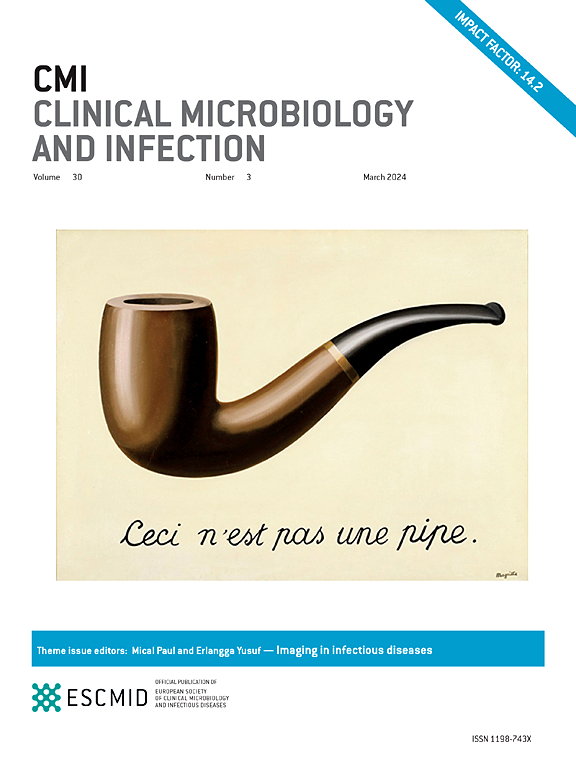The efficacy of antivirals, corticosteroids, and monoclonal antibodies as acute COVID-19 treatments in reducing the incidence of long COVID: a systematic review and meta-analysis
IF 10.9
1区 医学
Q1 INFECTIOUS DISEASES
引用次数: 0
Abstract
Background
Whether treatment during acute COVID-19 results in protective efficacy against long COVID incidence remains unclear.
Objectives
To assess the relationship between acute COVID-19 treatments of antivirals, corticosteroids, and monoclonal antibodies (mAbs) and long COVID incidence, and their effects in different populations and individual symptoms.
Methods
A systematic review and meta-analysis.
Data sources
Searches were conducted up to January 29, 2024 in PubMed, Medline, Web of Science, and Embase.
Study eligibility criteria
Articles that reported long COVID incidence post–acute COVID with a follow-up of at least 30 days with no language restrictions.
Participants
Patients with a COVID-19 diagnosis history.
Interventions
Patients treated with antivirals, corticosteroids or mAbs.
Assessment of risk of bias
Quality assessment was based on the Newcastle-Ottawa scale, risk of bias in nonrandomized studies of interventions-I and Cochrane risk of bias tool.
Methods of data synthesis
Basic characteristics were documented for each study. Random forest model and meta-regression were used to evaluate the correlation between treatments and long COVID.
Results
Our search identified 2363 records, 32 of which were included in the qualitative synthesis and 25 included into the meta-analysis. Effect size from 14 papers investigating acute COVID-19 antiviral treatment concluded its protective efficacy against long COVID (OR, 0.61; 95% CI, 0.48–0.79; p 0.0002); however, corticosteroid (OR, 1.57; 95% CI, 0.80–3.09; p 0.1913), and mAbs treatments (OR, 0.94; 95% CI, 0.56–1.56; p 0.8012) did not generate such effect. Subsequent subgroup analysis revealed that antivirals provided stronger protection in the aged, male, unvaccinated and nondiabetic populations. Furthermore, antivirals effectively reduced 8 out of the 22 analysed long COVID symptoms.
Conclusions
Our meta-analysis determined that antivirals reduced long COVID incidence across populations and should thus be recommended for acute COVID-19 treatment. There was no relationship between mAbs treatment and long COVID, but studies should be conducted to clarify acute COVID-19 corticosteroids' potential harmful effects on the post–acute phase of COVID-19.
抗病毒药物、皮质类固醇激素和 mAbs 作为急性 COVID 治疗方法在降低长期 COVID 发生率方面的疗效:系统综述和荟萃分析。
背景:急性 COVID 期间的治疗是否会对长期 COVID 发病率产生保护作用仍不清楚:急性 COVID 期间的治疗是否会对长期 COVID 的发病率产生保护作用仍不清楚:评估抗病毒药物、皮质类固醇激素和单克隆抗体(mAbs)等急性COVID治疗与长期COVID发病率之间的关系,以及它们在不同人群和个体症状中的效果:研究资格标准:研究资格标准:报道急性 COVID 后长期 COVID 发病率的文章,随访至少 30 天,无语言限制:干预措施:干预措施:接受抗病毒药物、皮质类固醇或mAbs治疗的患者:质量评估基于纽卡斯尔-渥太华量表、ROBINS-I 和 Cochrane 偏倚风险工具:记录每项研究的基本特征。随机森林模型和元回归用于评估治疗与长COVID之间的相关性:我们的搜索发现了 2363 条记录,其中 32 条被纳入定性综合,25 条被纳入荟萃分析。14篇研究急性COVID抗病毒治疗的论文得出结论,抗病毒治疗对长COVID有保护作用(OR 0.61,95% CI:0.48-0.79,p = 0.0002);但皮质类固醇(OR 1.57,95% CI:0.80-3.09,p = 0.1913)和mAbs治疗(OR 0.94,95% CI:0.56-1.56,p = 0.8012)没有产生这种效果。随后的亚组分析表明,抗病毒药物对老年人、男性、未接种疫苗者和非糖尿病患者的保护作用更强。此外,抗病毒药物还有效减少了22种长期COVID症状中的8种:讨论:我们的荟萃分析表明,抗病毒药物可降低不同人群的长程COVID发病率,因此应推荐用于急性COVID的治疗。mAbs治疗与长COVID之间没有关系,但应开展研究以明确急性COVID皮质类固醇激素对COVID急性期后阶段的潜在有害影响。
本文章由计算机程序翻译,如有差异,请以英文原文为准。
求助全文
约1分钟内获得全文
求助全文
来源期刊
CiteScore
25.30
自引率
2.10%
发文量
441
审稿时长
2-4 weeks
期刊介绍:
Clinical Microbiology and Infection (CMI) is a monthly journal published by the European Society of Clinical Microbiology and Infectious Diseases. It focuses on peer-reviewed papers covering basic and applied research in microbiology, infectious diseases, virology, parasitology, immunology, and epidemiology as they relate to therapy and diagnostics.

 求助内容:
求助内容: 应助结果提醒方式:
应助结果提醒方式:


